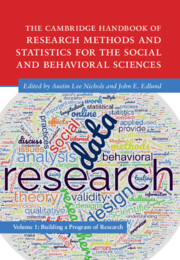 The Cambridge Handbook of Research Methods and Statistics for the Social and Behavioral Sciences
The Cambridge Handbook of Research Methods and Statistics for the Social and Behavioral Sciences from Part V - Tips for a Successful Research Career
Published online by Cambridge University Press: 25 May 2023
This chapter can serve either as a starting point or a recharging point for instructors who are preparing to teach research methods and/or statistics at the college or graduate level. Using empirical work and experience, I’ll discuss the importance of these classes and then provide a list of what I perceive to be the most important recommendations and biggest challenges related to teaching these courses. Because so many classes include projects, I have dedicated half of the recommendations and challenges to the ones that involve student projects. It is my hope that a person reading this takes away a set of ideas and feels empowered to teach these courses well. For all the challenges, teaching these classes can be rewarding for the instructor and transformative for the student.
To save this book to your Kindle, first ensure no-reply@cambridge.org is added to your Approved Personal Document E-mail List under your Personal Document Settings on the Manage Your Content and Devices page of your Amazon account. Then enter the ‘name’ part of your Kindle email address below. Find out more about saving to your Kindle.
Note you can select to save to either the @free.kindle.com or @kindle.com variations. ‘@free.kindle.com’ emails are free but can only be saved to your device when it is connected to wi-fi. ‘@kindle.com’ emails can be delivered even when you are not connected to wi-fi, but note that service fees apply.
Find out more about the Kindle Personal Document Service.
To save content items to your account, please confirm that you agree to abide by our usage policies. If this is the first time you use this feature, you will be asked to authorise Cambridge Core to connect with your account. Find out more about saving content to Dropbox.
To save content items to your account, please confirm that you agree to abide by our usage policies. If this is the first time you use this feature, you will be asked to authorise Cambridge Core to connect with your account. Find out more about saving content to Google Drive.